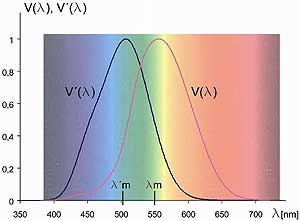Isn't there a thing with red light not changing your eyes 'exposure' level? Which is why it is also (used to be?) used for torches for people doing searches at night, it doesn't break your night vision. I guess that might be a reason to go for red?
That's true for any primary color. Green and blue work just as well.
It's all down to brightness, IMHO. Add a brightness control and any color will do.
Er no, blue and green don't work as well. It's down to the fact that you have two vision systems rods (scotopic) and cones (photopic). The scotopic system works in low light conditions (think moonlit mcd/m
2 or starlit µcd/m
2) and only gives you monochrome vision, the photopic system works in brighter light and gives you colour vision. If you look at the spectral sensitivity curves for the two systems you'll see that scotopic vision (V'(λ) in the graph) is almost completely insensitive to red.

The pigments in the visual system that respond to light suffer from bleaching, depletion in bright conditions where it takes time for the pigment to be regenerated. You can see this for yourself by looking at a bright object, close your eyes and you'll see an image persist on your retina for as much as several seconds. In daylight conditions the scotopic pigments are in a semi-permanent 'bleached out' condition which is why it takes time for your vision system to adapt to low light.
The scotopic system fails to absorb at long wavelengths so does not suffer the bleaching effect if it is only exposed to red light and thus red doesn't ruin your dark adaption. Expose yourself to bright monochromatic green or blue light and you will destroy your scotopic dark adaption. Following the response curve for the scotopic pigments, the shorter the wavelength (up to around a 480 nm peak) the more effect it will have on your night adapted vision.
If you're in low light, but bright enough to still be photopic conditions then monochromatic blue, green or red light would all be partially protective of low light
colour vision as long as they were used singly as there are three photo-pigments involved in the photopic regime.
In daylight conditions the scotopic pigments will still respond to really bright stimuli, which is why some bright blue lights (LEDs) near the sensitivity peak for scotopic vision are irritating as they are partially activating your night vision system while you're actively using your daylight vision system.